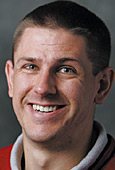Lawrence University Assistant Professor of Biology Ron Peck has been awarded a $289,390 Academic Research Enhancement Award (AREA) grant from the National Institutes of Health (NIH).
The three-year award will support Peck’s innovative research in biochemistry that employs the hardy microbe Halobacterium, which thrives in the concentrated salt water of the Great Salt Lake and the Dead Sea. This tiny but strange organism makes a “sunscreen” from the same chemicals that turn tomatoes red and carrots orange.

The NIH grant will enable Peck to investigate further how Halobacterium create the proper balance of these chemicals, providing insight into how all living things maintain the correct balance. Similar phenomena are found inside human cells, where chemical imbalances can lead to various diseases, including Alzheimer’s and retinitis pigmentosa.
“It’s fascinating to me that a microbe living in some of Earth’s most inhospitable places can reveal how molecules interact in our own bodies,” said Peck. “These obscure organisms may hold the key to solving the mystery of some of these diseases.”
The grant also will enhance Lawrence’s Student Undergraduate Research Experience (SURE) program, enabling more than a half dozen students during the summer to assist Peck in his research.
The NIH’s AREA grant program supports medical research at small universities like Lawrence where undergraduate students are active participants. In addition to advancing medical research, the program helps train the next generation of doctors and scientists.
“Receiving this grant demonstrates that high level research can and is being conducted at Lawrence,” said Peck, who joined the faculty in 2006. “The most gratifying times in my career are when students make breakthroughs when conducting research. You can really see how exciting it is for them to discover something that is completely new knowledge to science.”
Peck, whose scholarship includes microbiology, evolution and genomics, earned a bachelor’s degree in biology from Linfield College and his Ph.D. in biomolecular chemistry from the University of Wisconsin-Madison.
Based in Bethesda, Md., the National Institutes of Health is the largest source of funding for medical research in the world, supporting thousands of scientists in universities and research institutions in every state across America and around the globe. It operates under the auspices of the U.S. Department of Health and Human Services.